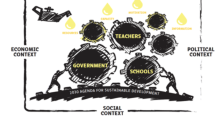Abstract
Performance pressure at both the institutional and individual level of secondary education has been identified as a pressure that is acknowledged all over Europe and raises questions about the extent to which agents in lower and upper secondary education interpret assessment in terms of either control or learning, or perhaps both. Drawing on empirical findings from two case studies in Denmark, the article focuses on the social roles of educational evaluation and assessment, and discusses the ways in which the local level interpretations of policy demands influence teaching and learning in secondary education. To enable an analysis of the understanding of different agents in the field, the article combines important sociological thinking with the basic distinction between assessment of programmes and assessment of individuals. Presuming that assessment practices bear the traces of the social structure that they both express and reproduce, the aim of this paper is to interrogate how the agents view and interpret such practices.
Similar content being viewed by others
Notes
This study is part of a post doctoral project by Annette Rasmussen on a social perspective on educational assessment.
The study of this department is part of a Ph.D. project by Nanna Friche on evaluation and assessment practices within vocational education and training in Denmark, conducted from 2007 to 2010.
References
Allerup, P., Andersen, H. L., Dolin, J., Korp, H., Larsen, M. S., Nordenbo, S. E., et al. (2009). Pædagogisk brug af test. Et systematisk review. Copenhagen: Danmarks Pædagogiske Universitetsforlag & Dansk Clearinghouse for Uddannelsesforskning.
Aron, R. (1980). La Lutte des Classes. In R. Bocock, P. Hamilton, K. Thompson, & A. Waters (Eds.), An Introduction to Sociology. Glasgow: Fontana.
Atkinson, P. (1985). Language, structure and reproduction. An introduction to the sociology of Basil Bernstein. London: Methuen.
Bernstein, B. (1996). Pedagogy, symbolic control and identity. Theory, research, critique. Rowman & Littlefield Publishers.
Borgnakke, K. (2008). Evalueringens spændingsfelter. Aarhus: KLIM.
Bourdieu, P., & Passeron, J. C. (1990 (1977)). Reproduction. In Education, society and culture. London: SAGE Publications.
Bourdieu, P., & Wacquant, L. (1992). An invitation to reflexive sociology. Cambridge Polity Press.
Broadfoot, P. (2007). An introduction to assessment. New York: Continuum International Publishing Group.
Broadfoot, P. M. (1996). Education, assessment and society. A sociological analysis. Buckingham and Philadelphia: Open University Press.
Claxton, G. (1994). Noises from the darkroom: the Science and mystery of the mind. London: Aquarian.
Cort, P. (2005). Quality assurance and development in the Danish IVET system. The Danish Institute for Educational Training of Vocational Teachers, March 2005.
Cort, P. (2008). The Danish approach to quality—in vocational Education and training (2nd ed.). Denmark: Ministry of Education.
Crooks, T. (1988). The impact of classroom evaluation practice on students. Review of Educational Research, 58(4), 438–81.
Deci, E. L., Kostner, R., & Ryan, R. M. (1999). A meta-analysis review of experiments examining the effects of extrinsic rewards on intrinsic motivation. Psychological Bulletin, 125, 627–88.
Eggleton, S. J. (1984). School examinations—some sociological issues. In P. Broadfoot (Ed.), Selection, certification and control. Lewes: The Falmer Press.
Filer, A. (2000). Educational assessment and testing: Social practice and social product. London: Routledge Falmer.
Foucault, M. (2002 (1975)). Overvågning og straf. Fængslets fødsel. Frederiksberg: DET lille FORLAG.
Foucault, M. (1985). The care for the self. The history of sexuality, vol.3, Penguin.
Harlen, W., Broadfoot, P., Gipps, C., & Nuttal, D. (1992). Assessment and the improvement of education. The Curriculum Journal, 3(3), 217–225.
Koretz, D. (2008). Measuring up. What educational testing really tells us. Harvard University Press.
Korp, H. (2006). Lika chancer i gymnasiet? En studie om betyg, nationella prov och social reproduktion. Malmö Studies in Educational Sciences, no. 24.
Jones, K., Cunchillos, C., Hatcher, R., Hirrt, N., Innes, R., Johsua, S., & Klausenitzer, J. (2008). Schooling in Western Europe. The new order and its adversaries. Palgrave Macmillan.
Madsen, U. A. (2003). Etnografisk forskning i det pædagogiske praksisfelt. In B. Tufte, J. Kampmann, & M. Hassel (Eds.), Børnekultur—et begreb i bevægelse. Copenhagen: Akademisk Forlag.
Ministry of Education. (2006). A culture of evaluation in Danish schools. Denmark: Ministry of Education.
Ministry of Education. (2007). A world-class education system. Part of the publication ‘Denmark’s strategy for lifelong learning’. Denmark: Ministry of Education.
Nevo, D. (1986). Conceptualization of educational evaluation: An analytical review of the literature. In E. R. House (Ed.), New directions in educational evaluation. London: The Falmer Press.
OECD. (1999). Measuring student knowledge and skills: a new framework for assessment. Paris: OECD.
Smyth, J., & Hattam, R. (2004). ‘Dropping out’, drifting off, being excluded. Becoming somebody without school. Peter Lang.
Torrance, H. (1997, reprint 2003). Assessment, accountability, and standards: Using assessment to control the reform of schooling. In A. H. Halsey, H. Lauder, P. Brown, A. Stuart Wells (Eds.) Education. culture, economy, society. Oxford and New York: Oxford University Press.
Harlen, W. (2006). The role of assessment in developing motivation for learning. In J. Gardner (Ed.), Assessment and learning. SAGE.
Acknowledgements
This work was supported by a post doc grant by the Danish Research Council for Independent Research, Social Sciences (autumn 2006). In addition, we would like to thank our colleagues at the Centre for Education Policy Research for their encouragement and fruitful comments.
Author information
Authors and Affiliations
Corresponding authors
Rights and permissions
About this article
Cite this article
Rasmussen, A., Friche, N. Roles of assessment in secondary education: Participant perspectives . Educ Asse Eval Acc 23, 113–129 (2011). https://doi.org/10.1007/s11092-010-9113-z
Received:
Accepted:
Published:
Issue Date:
DOI: https://doi.org/10.1007/s11092-010-9113-z




